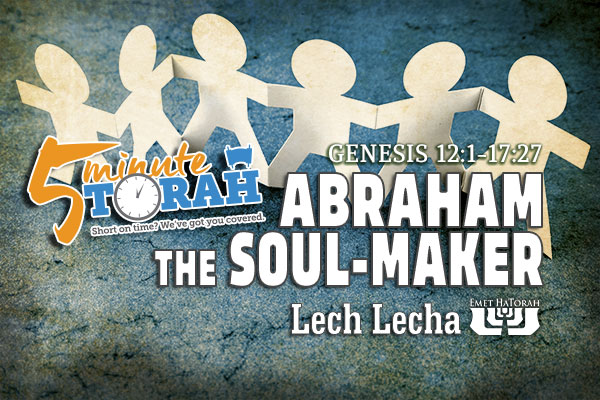Parashat Lech Lecha - Genesis 12:1-17:27
Series:

Abraham The Soul-Maker
At the end of last week’s Torah portion we were introduced to one of the most important characters in the Torah: the patriarch Abraham. At this time, however, he is simply known as Abram. Abram is the foundational material that Hashem uses to build both a people and a faith. Today, he is affectionately referred to as Avraham Avinu, Our Father Abraham. In the Apostolic Scriptures he is also called the father of all who believe (Romans 4:16). In this week’s Torah portion we read about the calling of Abram and how God commissioned him with a special purpose. The LORD also changes his name from Abram to Abraham as a promise of what the LORD was going to do through Abraham.
There is a curious passage, however, in our portion that begs to be explored. When God calls Abram to leave his family and his homeland, we read of Abram’s response:
And Abram took Sarai his wife, and Lot his brother's son, and all their possessions that they had gathered, and the people that they had acquired in Haran, and they set out to go to the land of Canaan. (Genesis 12:5)
The Torah tells us that Abram and Sarai left with Lot, their possessions, and “the people that they had acquired.” A hyper-literal reading of the original Hebrew, however, says that Abram and Sarai set out with “the souls they had made.” The midrash takes issue with this phrasing by saying:
If all the nations assembled to create one insect, they could not endow it with life. Yet the Torah says, “And the souls that they had made in Haran!” This refers to proselytes. (Genesis Rabbah 84:4)
The midrash tells us that the people that Abram and Sarai “made” were actually proselytes. In other words, Abraham didn’t just acquire slaves or servants in Haran. He made disciples. We can see evidence of this just two chapters later. When Abraham sets out to rescue Lot from his captors, it says that he took 318 of his “trained men,” who were “born in his house” into battle. The Hebrew word here for “trained men” means “follower” coming from the root chanak, meaning “dedicated.” It’s the same root that we get the word Hanukkah from, meaning dedication. These dedicated men were somehow “born” into Abraham’s house.
Later on in Genesis 17:23, the Torah distinguishes between Abraham’s slaves and his disciples when it lists those whom Abraham had circumcised. It says that he circumcised “all those born in his house or bought with his money.” The slaves were “bought,” while the disciples were “born.” Those who were “born” to Abraham were those who experienced a spiritual rebirth.
The midrash says that a person who converts a pagan from his idolatry is like one who has created him (Genesis Rabbah 39:14). Rambam, in his Mishneh Torah, says that the honor due one’s teacher is greater than the honor due one’s father. Why? Because a person’s father brings him into the life of this world, while his teacher, the one who teaches him wisdom (i.e. the Torah), brings him into the life of the world to come. Abraham’s investment into his disciples gave them the dedication to follow him even into death.
It was for this reason that the Almighty specifically chose Abraham to be called out from among his people. The LORD said, “For I have chosen him, that he may command his children and his household after him to keep the way of the LORD by doing righteousness and justice” (Genesis 18:19). Not only does is say that Abraham will teach his children, but that he will also teach “his household.” Abraham proved these words to be true not only with Isaac, but with his 318 disciples as well.
All of this let’s us know that Abraham invested into others. Abraham was a disciple-maker. How did Abraham make disciples? He and Sarah were known for their hospitality. They would continually have people in their homes, feeding them and teaching them about the one true God. They invested their time, their energy, and their resources into those whom they were discipling. Are we following in the footsteps of our father Abraham and making disciples as he did? If not, it’s never too late. Just take time to invest into others, loving them and teaching them how to live out the principles of Scripture. Better late than never. Let’s be soul-makers like our father Abraham.








